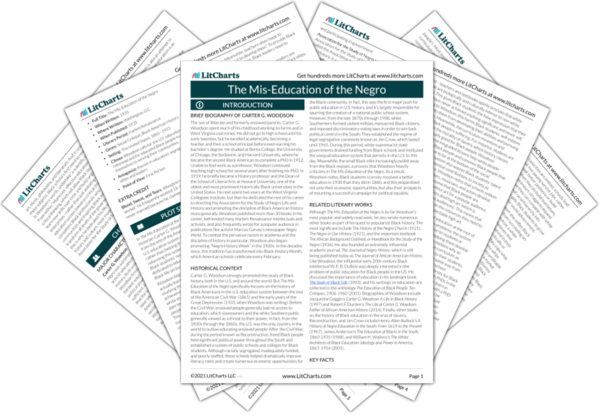The Black Masses Quotes in The Mis-Education of the Negro
This minister had given no attention to the religious background of the Negroes to whom he was trying to preach. He knew nothing of their spiritual endowment and their religious experience as influenced by their traditions and environment in which the religion of the Negro has developed and expressed itself. He did not seem to know anything about their present situation. These honest people, therefore, knew nothing additional when he had finished his discourse. As one communicant pointed out, their wants had not been supplied, and they wondered where they might go to hear a word which had some bearing upon the life which they had to live.
The elimination of the Negro from politics, then, has been most unfortunate. The whites may have profited thereby temporarily, but they showed very little foresight. How the whites can expect to make of the Negroes better citizens by leading them to think that they should have no part in the government of this country is a mystery. To keep a man above vagabondage and crime he needs among other things the stimulus of patriotism, but how can a man be patriotic when the effect of his education is to the contrary?
The Negroes, however, will not advance far if they continue to waste their energy abusing those who misdirect and exploit them. The exploiters of the race are not so much at fault as the race itself. If Negroes persist in permitting themselves to be handled in this fashion they will always find some one at hand to impose upon them. The matter is one which rests largely with the Negroes themselves. The race will free itself from exploiters just as soon as it decides to do so. No one else can accomplish this task for the race. It must plan and do for itself.
Right in the heart of the highly educated Negro section of Washington, too, is a restaurant catering through the front door exclusively to the white business men, who must live in the Negroes’ section to supply them with the necessities of life, and catering at the same time through the back door to numbers of Negroes who pile into that dingy room to purchase whatever may be thrown at them. Yet less than two blocks away are several Negroes running cafés where they can be served for the same amount and under desirable circumstances. Negroes who do this, we say, do not have the proper attitude toward life and its problems, and for that reason we do not take up time with them. They do not belong to our community. The traducers of the race, however, are guiding these people the wrong way. Why do not the “educated” Negroes change their course by identifying themselves with the masses?

The Black Masses Quotes in The Mis-Education of the Negro
This minister had given no attention to the religious background of the Negroes to whom he was trying to preach. He knew nothing of their spiritual endowment and their religious experience as influenced by their traditions and environment in which the religion of the Negro has developed and expressed itself. He did not seem to know anything about their present situation. These honest people, therefore, knew nothing additional when he had finished his discourse. As one communicant pointed out, their wants had not been supplied, and they wondered where they might go to hear a word which had some bearing upon the life which they had to live.
The elimination of the Negro from politics, then, has been most unfortunate. The whites may have profited thereby temporarily, but they showed very little foresight. How the whites can expect to make of the Negroes better citizens by leading them to think that they should have no part in the government of this country is a mystery. To keep a man above vagabondage and crime he needs among other things the stimulus of patriotism, but how can a man be patriotic when the effect of his education is to the contrary?
The Negroes, however, will not advance far if they continue to waste their energy abusing those who misdirect and exploit them. The exploiters of the race are not so much at fault as the race itself. If Negroes persist in permitting themselves to be handled in this fashion they will always find some one at hand to impose upon them. The matter is one which rests largely with the Negroes themselves. The race will free itself from exploiters just as soon as it decides to do so. No one else can accomplish this task for the race. It must plan and do for itself.
Right in the heart of the highly educated Negro section of Washington, too, is a restaurant catering through the front door exclusively to the white business men, who must live in the Negroes’ section to supply them with the necessities of life, and catering at the same time through the back door to numbers of Negroes who pile into that dingy room to purchase whatever may be thrown at them. Yet less than two blocks away are several Negroes running cafés where they can be served for the same amount and under desirable circumstances. Negroes who do this, we say, do not have the proper attitude toward life and its problems, and for that reason we do not take up time with them. They do not belong to our community. The traducers of the race, however, are guiding these people the wrong way. Why do not the “educated” Negroes change their course by identifying themselves with the masses?











